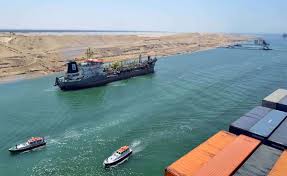Egypt has entered into a major $1 billion agreement with China’s Sailun Group to build a large automotive tire manufacturing plant in the Suez Canal Economic Zone. The deal, announced by the Egyptian Cabinet on Wednesday, August 13, 2025, is being seen as a big step toward boosting Egypt’s manufacturing industry and attracting more foreign investment into the country’s industrial sector.
The Suez Canal Economic Zone, which is located along one of the world’s busiest trade routes, is central to Egypt’s plan to expand its industrial base. Officials say the location will allow the factory to serve both local markets and export customers in Africa, the Middle East, and beyond. The project is also expected to strengthen the growing economic relationship between Egypt and China, which has in recent years seen increased cooperation in infrastructure, manufacturing, and trade.
According to the statement from the Egyptian Cabinet, the first phase of the tire factory will be completed by 2026. When operational, it will add significant production capacity to Egypt’s automotive supply chain, while also creating thousands of new jobs for Egyptian workers. The plant will require skilled and semi-skilled labour across different areas, including tire production, logistics, transport, quality control, and maintenance services.
Industry experts believe the factory will not only supply tires for passenger cars but also for commercial vehicles, trucks, and industrial machinery. This could help reduce Egypt’s heavy reliance on imported tires, saving foreign exchange and improving self-sufficiency in the automotive sector. It may also stimulate local suppliers who provide raw materials such as rubber, steel wires, and chemical components used in tire production.
The investment by Sailun Group, which is one of China’s largest tire manufacturers with a strong global presence, reflects confidence in Egypt’s long-term industrial potential. The company is expected to bring advanced manufacturing technology and training programmes for local employees. This will allow Egyptian workers to gain new technical skills and experience in high-standard production processes, a move that could enhance the country’s competitiveness in the global market.
Observers note that this deal comes at a time when many African countries are signing new industrial and infrastructure agreements with China. These projects are often positioned under broader economic partnerships aimed at improving manufacturing capabilities, building export capacity, and supporting economic growth.
In Egypt, the tire factory is expected to create opportunities along the entire value chain. Transport companies will benefit from increased freight demand, construction firms will gain contracts for building and infrastructure work, and local energy providers will supply power to the facility. There could also be a positive impact on related industries, such as vehicle assembly plants and aftermarket services.
However, some economic analysts have advised that Egypt will need to prepare the right environment for the factory to operate smoothly. This includes improving infrastructure such as roads, ports, and utilities, as well as ensuring efficient customs procedures for importing machinery and exporting finished goods. Strong regulatory oversight will also be important to maintain quality standards and environmental compliance.
The government’s ability to provide adequate workforce training will be another factor in the project’s success. Analysts suggest that vocational training programmes, in partnership with Sailun Group, could ensure that local employees are equipped with the knowledge to operate and maintain modern manufacturing equipment.
Despite the challenges, the agreement is widely viewed as a strong signal to global investors that Egypt is serious about expanding its manufacturing capacity. The $1 billion commitment from Sailun Group not only shows confidence in Egypt’s industrial vision but also highlights the strategic importance of the Suez Canal Economic Zone as a manufacturing hub.
By 2026, if the first phase is completed on schedule, Egypt will take a significant step toward achieving its industrial growth targets and boosting job creation, while also positioning itself as a key tire production centre in the region.
